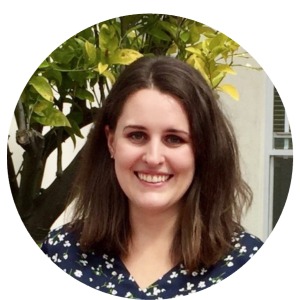
Research News periodically features a former Lab postdoc who has continued their career in academia, government, industry, or another sector. In this issue, we catch up with Stephanie Mack, who was a postdoc at Berkeley Lab from January to August of 2021 (she was also a postdoc at UC Santa Barbara for a year before arriving at the Lab). Today, she is a policy analyst at the State Department.
What have you been working on since you left the Lab?
After I left the Lab, I spent about a year and a half on Capitol Hill, first as a AAAS Science and Technology Policy Fellow sponsored by the American Physical Society before being hired by the office, working for Senator Whitehouse on energy and climate issues. In January this year, I became a policy analyst, also as a AAAS Science and Technology Policy Fellow, with the State Department’s Nuclear Competitiveness Team, working to promote nuclear clean energy solutions through advancing opportunities for bilateral and multilateral cooperation on advanced nuclear energy programs, including capacity building in partner countries that are establishing nuclear energy programs to meet their climate and energy security goals.
What did you work on as a postdoc at the Lab?
I worked with Jeff Neaton, who was also my Ph.D. advisor at UC Berkeley, so it was a continuation of my graduate school work using electronic structure theory calculations to understand and predict material properties, such as developing high throughput workflows through the Materials Project to predict materials with coexisting ferroelectric and magnetic properties. I also finished a paper with our experimental collaborators at Stanford on unique perovskite materials for potential solar applications.
What was your experience like at the Lab?
It was during the pandemic, which posed some challenges, but Jeff was an amazing advisor and the culture of the group was very supportive on scientific matters and professional development, as well as supporting each other through pandemic challenges.
What resources did you take advantage of?
As a grad student and postdoc, I took advantage of many BLPA events, as well as Career Pathways Office offerings including interview practice opportunities, which were helpful preparing for my fellowship interviews.
I participated in the Poster SLAM at the Molecular Foundry’s user meeting and in university SLAM competitions while I was a grad student at UC Berkeley. I highly recommend taking these opportunities to practice your communications skills. Knowing how to tailor your message to different audiences is invaluable. Working on the Hill and at the State Department, being able to communicate technical information effectively to a wide range of stakeholders and colleagues is really important.
How did you decide on your career path and to what extent did Berkeley Lab support you in your career path?
I started to get more interested in policy as a grad student after chatting with several other grad students about their interest in it. Together, four of us started the Science Policy Group at Berkeley. We then attended the AAAS CASE workshop in D.C., which exposes scientists to the federal policymaking landscape. While I was still focused on an academic career at the time, I felt it was important for scientists to learn how to be involved in policy and that scientists have a responsibility to be informed, active citizens.
As time went on, I became more and more curious about policy as a career and explored transitioning from researching energy materials to understanding the federal policymaking process to facilitate innovation and the deployment of clean energy technologies. I learned about the AAAS Fellowships through alumni at the Lab working in the Energy Sciences Area, including Branden Brough, Ashley White, and Melissa Summers. The Lab is a great nexus of people with experiences across academia, industry, and government, so it offers opportunities to explore different areas. I slowly grew to realize that I wanted to make policy more central in my career and succeeded in securing a fellowship to work in Congress.
What is it like working in policy?
Policy presents interesting challenges; you have to take into account so many inputs beyond the scientific and technical knowledge. You have to consider legal or regulatory frameworks and the many stakeholder perspectives, especially communities directly impacted by policy outcomes, and values to uphold in achieving policy goals. I’m someone who likes that sort of challenge and I’m on this learning journey that I’m finding really exciting.
Do you have any tips for current postdocs?
As a postdoc at the Lab, you should take the time to meet as many people as you can. Take advantage of the Lab community to meet people and learn about different perspectives. Also, network outside your institution. Find opportunities to present your work as early and often as you can. Get to know the communities that you’re interested in and make sure they’re getting to know you and your work.
Now that I’ve spent some time away from the Lab, I can really appreciate Berkeley Lab and why the national labs are referred to as DOE’s “crown jewels.” Scientists and students at the Lab have a unique opportunity and a great set of resources to take advantage of. I really enjoyed my time there.
Other stories in this series:

